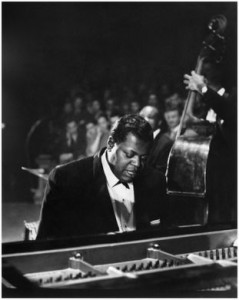 It took me a long time to get into Oscar Peterson. His compositions seem, at first, to be casual little puffs, dashed off effortlessly. This is an illusion. As you let them sink in, you realize what incredible precision, control, and subtlety they have. Peterson is as cool as a plate of sliced cucumbers served on a bed of freshly fallen snow, but there is an emotional power behind it. The precision itself becomes an emotional statement: this is exactly how things should be, this is where this note belongs, this is the precise one hundredth of a second it should be struck.… see! Not for everyone, but for those who feel it, it’s ambrosia.
It took me a long time to get into Oscar Peterson. His compositions seem, at first, to be casual little puffs, dashed off effortlessly. This is an illusion. As you let them sink in, you realize what incredible precision, control, and subtlety they have. Peterson is as cool as a plate of sliced cucumbers served on a bed of freshly fallen snow, but there is an emotional power behind it. The precision itself becomes an emotional statement: this is exactly how things should be, this is where this note belongs, this is the precise one hundredth of a second it should be struck.… see! Not for everyone, but for those who feel it, it’s ambrosia.
Peterson is without contest Canada’s jazz giant, the man who speaks for us. Duke Ellington is just as deeply American. Their jazz pantheon is so huge that he can’t claim unchallenged primacy, but surely he’s among the greatest American jazzmen. Like Peterson, Ellington was a perfectionist, a man who planned every note, a classicist at heart. He didn’t much resemble the troubled, erratic geniuses that people associate with jazz. His brilliance was so obvious that nothing could keep his compositions out of the symphonic repertoire, even in the 1920s. Ellington had a stronger, louder voice than you hear in Peterson’s delicate, contemplative compositions. So is there a conflict? Hardly. Playing Ellington seems to have allowed Peterson to cut loose. You hear another Peterson, sassier than when he played his own stuff. I love this record.
0 Comments.